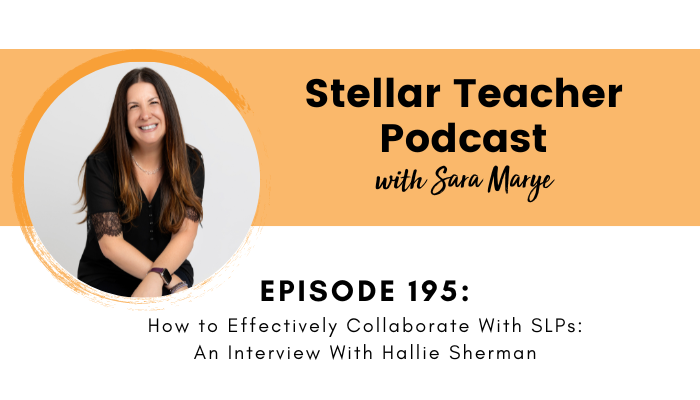
Click play below to hear ways to effectively collaborate with SLPs:
I’ll be honest: when I was teaching in the classroom, I knew very little about the work Speech Language Pathologists, or SLPs, did in schools. I knew they pulled students to work on speech services, but not much beyond that. After my conversation with today’s guest, Hallie Sherman, I gained a deeper understanding of the role of an SLP and how they help students with their language, which affects their reading comprehension. In today’s episode with Hallie, you’ll learn how to effectively collaborate with SLPS, ways they support students, and practical strategies you can use in your own classroom.
We start our conversation with Hallie explaining the role of an SLP, particularly in a school setting, and the type of speech services they provide. I learned that the majority of their work with students in upper elementary isn’t correcting speech sounds but really working on connecting the language concepts with comprehension. Hallie shares how language comprehension and supporting students in that area impacts their reading comprehension, which is so important to literacy teachers.
The goal of an SLP is to support students in their language comprehension, which ultimately helps them become more successful readers in the classroom. Hallie is a wealth of knowledge who gives great insight into how most speech goals for upper elementary students are closely related to reading goals, ways to collaborate with SLPs, and identifies ways students can benefit from speech services. I hope this episode has enlightening and insightful information to help you better understand how SLPs can help and be an asset to your classroom and students.
Meet Hallie
Hallie Sherman
Hallie Sherman, M.S. CCC-SLP, is a licensed speech-language pathologist in New York. She worked in public schools for over 15 years before she left the schools to work as the CEO full-time for Speech Time Fun, Inc. At Speech Time Fun, Inc., Hallie provides materials and training for SLPs working with grades 4-12 to help them plan with ease and confidence. She does this through her SLP Elevate membership, her TPT resources, her podcast, SLP Coffee Talk, her virtual conference she hosts 3x a year called the Speech Retreat, and the other various trainings for organizations and associations.
In this episode on ways to collaborate with SLPs, we discuss:
- Practical tips and strategies for identifying how students could benefit from speech services
- The role of an SLP and ways to collaborate with SLPs in a way that positively impacts your students
- How language comprehension can impact reading comprehension, which is one of the main goals SLPs work on with students
- What qualifies a student for speech and language services
- Hallie’s insight into a speech session with strategies, tasks, and activities
Resources:
- Join us for my FREE Summer Book Study
- Sign up for my Private Podcast: Confident Writer Systems Series
- Check out the Stellar Literacy Collective Membership
- Check out my Free Literacy Workshop, The Time Crunch Cure: Create a Literacy Block That Fits it All In and Achieves More
- If you’re enjoying this podcast, please leave a review on Apple Podcasts!
Related episodes and blog posts:
- Episode 153, Simple Strategies to Strengthen the Language Domains for Your ELL Students with Beth Vaucher
- Episode 87, Breaking Down the Elements of Language Comprehension (and Practical Implementation Ideas!)
- Teaching Language Comprehension in Upper Elementary
Connect with me:
- Join my newsletter
- Shop my TPT store here
- Instagram: @thestellarteachercompany
- Facebook: The Stellar Teacher Company
More About Stellar Teacher Podcast:
Welcome to the Stellar Teacher Podcast! We believe teaching literacy is a skill. It takes a lot of time, practice, and effort to be good at it. This podcast will show you how to level up your literacy instruction and make a massive impact on your students, all while having a little fun!
Your host, Sara Marye, is a literacy specialist passionate about helping elementary teachers around the world pass on their love of reading to their students. She has over a decade of experience working as a classroom teacher and school administrator. Sara has made it her mission to create high-quality, no-fluff resources and lesson ideas that are both meaningful and engaging for young readers.
Each week, Sara and her guests will share their knowledge, tips, and tricks so that you can feel confident in your ability to transform your students into life-long readers.
Tune in on your favorite podcast platform: Apple, Google, Amazon, Spotify, Castbox, and more! If you’re loving this podcast, please rate, review, and follow!
Podcast (stellar-teacher-podcast): Play in new window | Download
Sara
Hey there, and welcome back to another episode. Today we are talking all about speech services, and how you can effectively collaborate with SLPs to really support your students who are receiving speech.
Sara
Now, when I was in the classroom, I definitely had students that got pulled out to receive their speech services. But if I’m being honest, I didn’t always know what it was they were working on with the SLP when they left my classroom, and I really had no idea how to best support them in the classroom. Now, if you can relate to that, then today’s episode is really going to resonate.
Sara
And that’s because I am bringing on Hallie Sherman, a licensed SLP, CEO of Speech Time Fun and the co host of SLP Coffee Talk, and she is talking all about speech services in upper elementary. Hallie shares some really practical tips and strategies, including how to identify if students would benefit from speech services, and then how you can collaborate with your SLP to make sure that you’re best supporting your students.
Sara
Now, Hallie shares some really great insights into how language comprehension impacts reading comprehension, and how most speech goals for upper elementary are really so closely related to reading goals. I know you’re gonna get a lot out of this episode. Let’s go ahead and welcome Hallie to the show.
Sara
Hi, Hallie, welcome to the show. I am so excited to have you on today.
Hallie
I’m so happy to be here. Thank you so much for having me.
Sara
Absolutely. So Hallie is an SLP. And I often get questions from listeners that refer to how do I support students who need services in whatever area? So I’m super excited to have her on today because she’s gonna be able to just give a lot of insight and how do we support our students that have speech challenges? And really, what are some of those challenges that we might want to look for? So before we kind of jump into that a little bit, Hallie, can you describe a little bit about what an SLP actually does?
Hallie
Sure. So speech language pathologist, we are licensed to work from birth to geriatrics, that’s our scope of practice, we can work from anything with the babies to working in a nursing home, anything language speech feeding, that is our scope of practice.
Hallie
That said, in a school based setting, our scope is a little bit different and a little bit more narrow. We are basically providing the free and appropriate education according to IDEA, those that warrant services. And usually that is due to a need of a disability, an IEP, an evaluation that has been performed that designates that there is a speech and language disability that warrants services that is adversely impacting their academics, or their ability to function.
Sara
Yeah. And can you explain a little bit because for I feel like there’s like the speech, disability, and then the language disability. And I think for the longest time, I used to think that like SLP is just helped students that have like stuttering problems or have like a Lisp or a hard time like saying the letter Rs, but there’s this whole like language side of it that you support students with. So can you kind of clarify a little bit about the difference between the two?
Hallie
Sure. So yes, we do both. We do work with articulation, those students that are sound. Lisps are very rare to see in the school setting, because it’s very hard to say that a lisp is really preventing them for performing academically, very hard to prove. And that’s why it’s very common in the school setting that 90% of our cases, especially with those upper grades, is really language based, because that’s what’s really impacting them academically.
Hallie
And that is whether their their ability, their vocabulary, the sentence structure, being able to answer questions, listening, comprehension, all of those things are our domain that we work on. Those are the types of speech and language goals that we address. And that really does impact their ability to participate in the classroom, socially, academically, etc. So it’s really I always say like, it’s funny, cause we’re always referred to as the speech teacher, but really in the schools, we should be called the language teacher in reality.
Speaker 1
Yeah, absolutely. I was gonna say and that was like one of those things where I don’t think it was until I became an assistant principal and I was sitting in on a lot of SLP meeting and I was like, oh, wait a minute. There’s like so much more to this than just the articulation side of things.
Sara
I love of course, you know, thinking about language because everything we talked about their, you know, the vocabulary sentence structure answering and asking questions. We talked about all that from like a literacy perspective as well, because so much of it is tied together, can you really talk a little bit about, you know, how language comprehension or why supporting students with the language aspect of speech can have an impact on their reading comprehension and what that connection really is?
Hallie
So your audience knows this, in order to be an effective reader, our students need to have what decoding skills and comprehension skills. And we know that comprehension is language, syntax, memory, reasoning, background knowledge. And all of that is language. And if our students don’t have those fundamental skills, and we have to assume that they’ve been exposed to it, and it’s not sticking, there might be something else going on.
Hallie
So I always use the insanity quote, are we doing the same things over and over again and expecting different results, then maybe there’s something else going on, if you are utilizing the strategies that I know you already teach your teachers to utilize. There might be something else going on that they might need more support than what we can provide in the classroom.
Sara
So thinking of that, right, you know, and again, I love that I’ve kind of wished that like speech teachers were referred to as like reading intervention teachers, because if you’re supporting students with the language side of things, they are going to see an increase in their reading comprehension.
Sara
But you know, to your point of if we’ve been doing the same things, and we’re not seeing the results that we want, so if a teacher is, you know, putting all of the right strategies in place, and their students still aren’t comprehending the way that they want, what are some signs that it might be a language issue that a speech pathologist could support? So like, what are some things that teachers should really look for, that might be indicators that their students would benefit from speech services?
Hallie
That they’re not picking up on things indirectly, that they’re needing a lot more explicit instruction, and even with that, they are still falling behind. So whether it is new vocabulary words, they’re not utilizing, you might be teaching them utilizing context clues and root words and prefixes and all that fun stuff. And it’s still not sticking.
Hallie
Locked in speech pathologists, as part of our assessment, we do dynamic assessment, do the test, teach retest, and if by teaching it a little bit is not enough, that means they need more support by someone who can focus and hone in on why they are unable to get grasp those strategies.
Hallie
If there’s something going on that their their vocabulary, they’re not able to grasp it, that maybe there’s difficulties with sentence structure, if they, they don’t understand different sentence structures, they’re not gonna understand when the complex readings that you’re doing, they’re not grasping it enough to then make a main idea to retell it in their own words, like all those things are going to be holding them back.
Hallie
And I know that teachers are busy, you have classes of 30 students, you don’t have time to be sitting there and like trial and error with just that one student, you might be working with that group during your like small group stations. But how often are you even working with our group, even if it was like 15 minutes every single day, there might just not be enough for that student?
Hallie
And you might need to have that more comprehensive evaluation to say, is there something else going on? Maybe it’s it memory, they’re struggling with attending things, maybe it’s their processing speed, they’re unable to process in a certain rate that is allowing them to stay with the curriculum and stay with what you’re doing. Maybe, again, weak vocabulary, maybe it’s that they can’t handle lengths of a text that that their memory can’t handle that.
Hallie
So all those different things, a speech pathologist can help troubleshoot and determine is there something else going on? That is the reason for them not making the progress that you think they should be making? By utilizing, like, first that’s like, RTI, we’re going to try these strategies, you try these things. And that’s why when you bring it to the table, like, Hey, I tried XY and Z, and they’re still not making the growth. I think there might be something else going on.
Hallie
And it could be attention, it could there’s so many other things that it could be, but it’s something to explore. If you’re finding that, you know, if they have trouble following directions, that’s another sign okay, then maybe it could be memory, but it also could be that they have trouble with listening comprehension.
Hallie
It may be there when you’re doing a vocabulary exam. You know, when you’re practicing it with the flashcards they got it, they got it, they got it, you give them the test, they can’t do it. There might be a reason why they are really struggling to learn new vocabulary words, they need more exposures, and more interventions in order to be able to grasp it.
Sara
Yeah. And some students, you know, it’s like, especially you mentioned the RTI thing, right? It’s like you do the whole group instruction, and a lot of your students will master the concept or the objective and that whole group lesson but then you’ve got a smaller group of students who are going to need the support in small group and then even from the small group, there might be a handful of students that that small group support is not even enough and they need even more support.
Sara
Now, I know that just because we’ve identified students in our class because I’m sure that as teachers are listening to this, they’re like, oh, yeah, I can think of a kid right now that is struggling to follow directions, like has a hard time grasping vocabulary, really struggles with sentence structure, I think they would be a good candidate for speech.
Sara
Now, just because we can identify a student in our class that might benefit from some of these like interventions and supports an SLP can offer, I know, that doesn’t necessarily mean that they would actually qualify for school based speech services. So can you provide maybe some very specific things or criteria that you guys look for that would allow a student to qualify for that school based speech service?
Hallie
So again, unfortunately, our hands are sometimes tied. And we have to utilize standardized assessments, which are not always normed to all of the students we work with. And we know that, but unfortunately, we have to have these qualitative numbers to basically tell the admin that, hey, you have to fund this.
Hallie
And every district has a little bit more, some districts have a little bit more flexibility. But it’s usually like two standard deviations below the mean, on one area, or one standard deviation below the mean, on two areas, we have to do a comprehensive assessment. That’s why also the more comprehensive they do, the more information to provide.
Hallie
So you’re providing that RTI information like, hey, look, we’ve tried all these things in the classroom, and it’s still not working, that allows the SLP to probe further and say, hey, the teacher seeing this, after I do that comprehensive eval that I have to do, let me probe a little further on this. And again, doing some dynamic assessment, seeing where they break down can really help them determine either one, do they qualify, and sometimes they might not qualify, and we can say, hey, try this instead, maybe this might work.
Hallie
And they might be able to just try a little different strategy that might seem to be beneficial, and then report back to you. But you won’t know unless you give them that information and show them hey, I did the work first, I got as much information first, I tried everything. And now let’s see if there’s more to it than what you’re seeing.
Sara
Yeah, so those classroom interventions, and the data collection by the teacher is so important if we have a student that we really think is going to qualify and would benefit from working with an SLP.
Sara
So what are some of the things like what are some of the various specific strategies or you know, tasks, activities that you work on, when students come to see you, whether it’s individually or in a small group, like, give us a peek inside of a speech session.
Hallie
A lot of it does mimic and a lot of SLP say, like, Hey, I’m doing I feel like I’m being a tutor, or I’m being a reading teacher. And because we are doing the same things, we might just be doing it a little bit slower, a little bit more at that students pace a little bit more individualized that students needs and what they might be getting in the classroom. And that’s okay.
Hallie
But whether it is utilizing graphic organizers, teaching our students explicitly how to use it, and what to listen for, to organize their thoughts to reduce that cognitive overwhelm, there’s so much evidence that shows that just using a graphic organizer, makes things visually like easier for students to graph.
Hallie
And again, I always tell SLPs, this, like, don’t do the graphic organizer after you read you while you read. And you can’t assume just giving it to them. Hey, here’s a summarizing graphic organizer, good luck. We have to explicitly teach them how to do it, how to stop after reading a few paragraphs or a few words sometimes, and how to prompt ourselves how to have that self talk.
Hallie
SLPs work with our students to teach a model how to have that self talk, and how like self talk is talking and language. And we can’t just assume that they know how to like internally think, Hmm, do I know who the main character is yet? Like no, we need to teach them that script to like what to say and how to stop and know when to self check and self reflect and how to utilize it.
Hallie
So the explicit teaching and the modeling that self talk those conversations scripts, is something we often utilize in the speech room to teach them just how to then modeling and showing them how it’s gonna help them be effective. Again, whether it teaches them that text structure teaches them how to like see the connections between different things. So we really truly, that’s one of the strategies that like SLP is used to help students in the classroom, but then again, working on those language skills at their individualized level and needs.
Sara
I love that. And honestly, as you’re talking through this, I was like you guys are reading teachers. You are helping students become better readers, you are absolutely reading teachers.
Sara
I know you had mentioned that a lot of times SLPs do the same thing that teachers are doing in the classroom. Is it one of those things where it’s like if you have a student who is working with an SLP for speech services, should there be collaboration between the classroom teacher and the SLP? Like should there be overlap with like what they’re doing in the classroom is the exact same thing they’re doing in speech services, or should there be like variation in difference between those two settings?
Hallie
Both. So yes, we would love to collaborate unfortunately, so many times it’s the we have case loads of 65, 75, 85, 95 however many students and there’s only so many hours in a day. And often, when you are on prep, that’s when I’m seeing your students. So when are we supposed to collaborate?
Hallie
So it’s very, very hard to, but in an ideal situation, yes. How are they doing in the classroom? How can I support you and work with them in my speech closet to help you so that they are making progress with you?
Hallie
That’s the ultimate goal is carryover and that they don’t need us anymore, we want to keep them in the classroom. Like I always say, like it’s not a life sentence when they get speech, it’s hopefully a short term intervention to get them exactly what they need. And the best scenario is that teacher speech pathologist collaboration, and working together really will help that.
Hallie
That said, sometimes we might be doing something different only because that’s what they need in that moment, in order to be able to access the curriculum. So we might be doing things at their independent reading level, or at a, we might be working on listening comprehension, and not even reading, we’re just working on the comprehension part, to help teach them those skills before we can bring in the text. So we might be doing similar things. But maybe a little different, depending on the needs, but the only way of knowing that is by communication.
Sara
I love that. So ultimately, right like a speech therapist, or a speech language pathologist is really going to be helping students become more successful readers in the classroom.
Hallie
Yeah, our goal is that they’re successful learners, students, communicators, and eventually successful in the outside world.
Sara
Well golly, gee, I mean, like I said, I and I’ve learned a lot about SLPs. But especially when I was in the classroom, I very much had this limited understanding that I thought that the primary role of speech language pathologists was to help with the articulation side of things.
Sara
And so if you are a teacher, who is listening, recognize that you have SLPs on your campus that can support students that have difficulties with language comprehension, which we know encompasses so many different things, vocabulary, background knowledge, sentence structure, especially. So really be on the lookout in your class for students who you think might benefit from working with an SLP and then reach out to the team at your school. And maybe that’s a process that can get started here before the school year ends, or before the year begins next year.
Sara
So Hallie, thank you so much for coming on today. I feel like this was just really enlightening and insightful. And I know if anything, teachers are probably really encouraged to know that there’s somebody else on their campus that is supporting their reading goals as well.
Hallie
Yes, especially if you’ve again, tried the same thing. Like if you keep trying something and it’s not working maybe it’s it’s not you, there might be something else going on. And the best thing you can do for your students is just ask. What’s the worst thing that happens and say, hey, you know what the paperwork like that’s the worst thing that happens.
Sara
Well, where can my audience find you online if they want to learn more about what SLPs do, or if they’re looking for specific resources that might benefit their students?
Hallie
Sure. I’m on Instagram and Facebook at Speech Time Fun. My blog is speechtimefun.com, where I have tons of resources, activities, strategies for working on various comprehension goals. I also have a podcast, the SLP Coffee Talk podcast, where it’s the jolt of inspiration SLPs need on a Monday morning, and I’m always sharing things over there. So feel free to say hi, and yeah, if you have any questions, send them my way.
Sara
Awesome. Thanks so much for joining us today, Hallie.
Hallie
Thank you so much for having me.


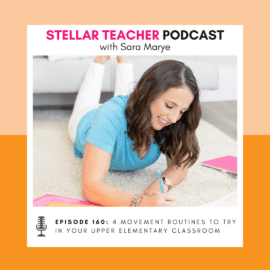

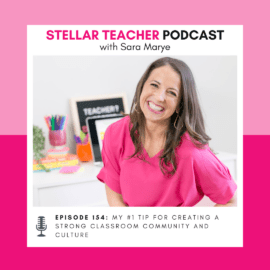
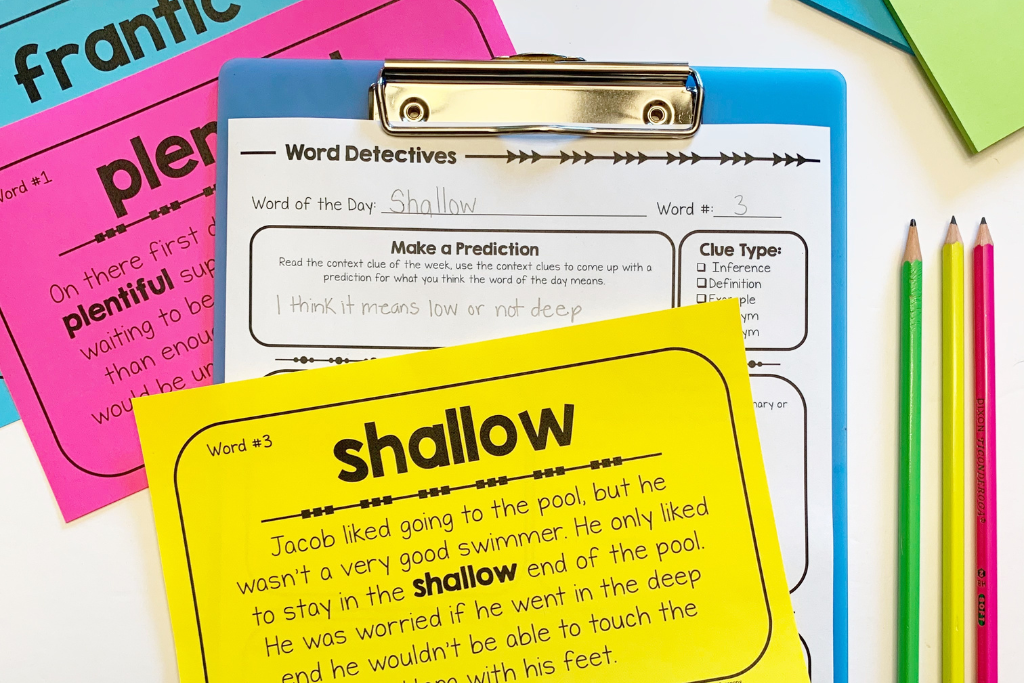

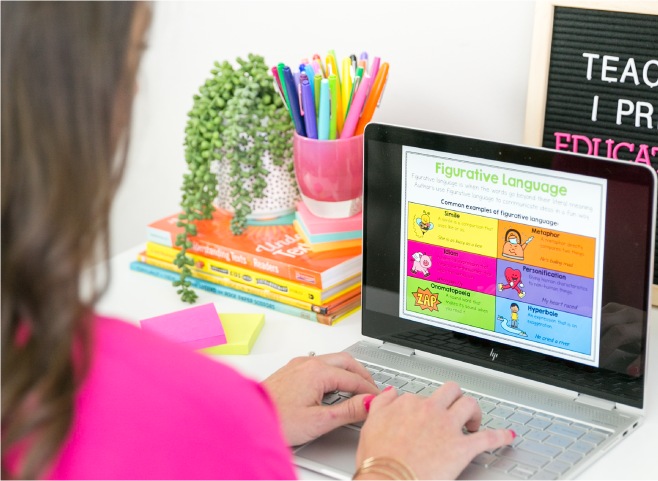
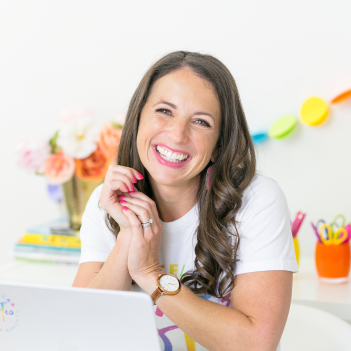
Leave a Comment
You must be logged in to post a comment.